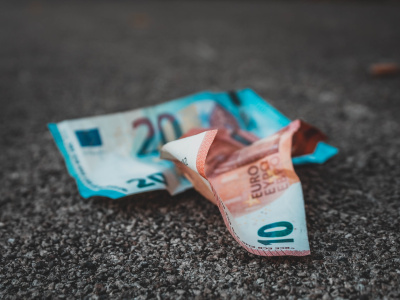
International crimes during apartheid: Why Cyril Ramaphosa is still paying South African debt to foreign banks
The biggest mystery about apartheid has been solved. We now know how the apartheid regime in Pretoria could continue to buy arms after the global mandatory arms embargo in 1977. Sanctions-busting prolonged the life of white rule and created the conditions, networks and bad habits that linger on today.
Nowadays, the corruption court cases against South Africa’s former president Jacob Zuma reveal how international arms networks continue to contaminate governance systems in an emerging democracy.
On guns, nuns and banks
She holds one share and asks the floor. Looking frail in the all-male shareholder meeting of the Kredietbank headquarters in the Belgian port city of Antwerp.
The atmosphere is tense as she asks some awkward questions in this business-like and high-powered environment. Will the Kredietbank continue to prop up apartheid? Will this Christian bank continue its lending to strategically important state-owned enterprises in South Africa and to the independent homelands? If so, her Catholic congregation will close its bank accounts with the Kredietbank because of its unethical behaviour.
Someone at the front table jumps up and tries to silence her. It is the chairperson of the board of directors, André Vlerick. The bank’s CEO pulls Vlerick back.
A few more nuns will take the floor with similar messages, calling for justice and accountability. The senior management denies any wrongdoing and continues with the order of the day – and with financial business as usual.
Now, more than three decades later, two South African NGOs have calculated and revealed the heavy costs of business as usual under apartheid.
Enters Hennie van Vuuren
Hennie van Vuuren, South African activist and director of Open Secrets, has painstakingly traced the illicit ways foreign bankers, spies, undercover agents, arms dealers and arms producers maintained a covert global network to arm apartheid.
Over a 15-year period after the mandatory arms embargo of the UN Security Council in November 1977, the regime spent the equivalent of €33 billion from a Special Defence Account. The spending was kept hidden under secrecy acts.
Hennie has been scrutinising for five years declassified state records and affidavits of various trials in courts in Lisbon, Paris, Brussels and Luxembourg. He has made hundreds of interviews to reveal the illicit networks that have fuelled the apartheid machine.
In his highly insightful book Apartheid, Guns and Money, van Vuuren explains the system behind the madness. The findings are revealing and shocking.
They demonstrate the complicity of numerous governments, bankers, arms producers and a host of intermediaries that contributed to the massive violations of the arms embargo.
The evidence proves what so far had been only a hunch: that the Belgian Kredietbank and its Luxemburg daughter, KBL, have been pivotal in the massive illicit arms bazaar.
The Kredietbank provided wholesale credits to ARMSCOR, the South African state-owned enterprise at the centre of arms purchases and arms production. And KBL helped by orchestrating secret bank accounts, front companies and middlemen of all sorts who contributed to the illicit arms trade.
KBL, through this carefully devised network, assisted in a massive money laundering scheme. It acted on almost weekly instructions of 25 ARMSCOR operators, housed on a secret floor of the South African embassy in Paris.
The key operator admitted that KBL facilitated up to 70% of all illegal purchases in the 15 years of sanctions-busting. Given the nature and the volume of these deals, the senior bank management must have known and condoned these illicit transactions, which oiled the wheels of the apartheid military.
The past is never dead
To grasp the seriousness of it all, one has to revisit the scene of the crime.
In the second half of the 70s, the apartheid rulers in South Africa were in dire straits. The international community had started to impose diplomatic and economic sanctions after the South African military had shot – and killed – more than 100 black school children who were protesting in Soweto, in June 1976.
During the weeks that followed, many more students throughout the country died in the violent repression of their protests against the compulsory learning of Afrikaans in schools.
The unrest continued the following year with further clampdowns on peaceful opposition organisations. It culminated in the brutal murder of anti-apartheid activist Steve Biko while he was being detained by state security.
Following these events, the UN Security Council agreed on a mandatory arms embargo against apartheid South Africa in November 1977.
Simultaneously, in a sublime test of bad taste and poor timing, André Vlerick launched a pro-apartheid offensive to counter ‘anti-apartheid propaganda’, as he put it. This former Christian democratic minister of finance – inspirator behind the now internationally renowned Vlerick School of Management – and banker, managed to convince almost 200 prominent Flemish politicians, academics, artists and business people to sign up to Protea, as the lobby was called.
They believed in Vlerick’s version of the apartheid regime as a promoter of ‘separate development’ – as apartheid was euphemistically coined. Vlerick, moreover, was close to the major protagonists at the centre of the sanctions-busting network. South Africa’s Prime Minister Pieter Willem Botha was a central figure in that web of secrecy.
Botha rapidly transformed the country from a police state into a military security state to preserve white hegemony. He called this strategy a ‘total war against a total onslaught’ and mobilised all forces to fight this hell-bound war. But to make this strategy work, he needed access to arms, arms technology and strategic military equipment.
While South Africa and its state company ARMSCOR had some capacity for arms production, it remained extremely dependent on the global arms market.
The UN’s mandatory arms embargo was intended to weaken the resolve of the regime and reduce its capability to shoot its way to the exit. But with the help of some friends, the apartheid regime managed to violate the embargo.
The secretly acquired arms would serve multiple purposes: beef up the regime’s internal repressive and military capabilities to quell unrest in the townships, maintain an ever-stronger presence of the army in those areas and arm rebel forces to fight proxy wars in neighbouring countries.
The regime also used its military power for occupying and plundering Namibia, wage war in Southern Angola and mobilise the more sophisticated machinery for air strikes against neighbouring capitals. Botha kept his promise: South Africa engaged in a total war.
The costs of this war were phenomenal. Hennie says that if foreign governments and private companies had taken appropriate action to support the UN’s arms embargo, the regime in Pretoria “would have been forced much sooner to make fundamental concessions”.
The longer lifespan of apartheid has, directly and indirectly, resulted in additional suffering in the country, and hundreds of thousands of deaths in war-torn Southern Africa.
A smoking gun, but where’s the sheriff?
“I see the Eiffel Tower lights are shining today.”
Apparently, these were the code words with which deputy President Zuma accepted a bribe from the French arms company Thales in the late 90s.
Bad habits, criminal networks and secrecy laws of the past continue to contaminate today’s democratic South Africa.
When he was Deputy President, Zuma received 783 payments that were linked to corrupt transactions for international arms purchases – partly involving the same foreign culprits as those involved in the apartheid arm’s bazaar.
The continued impunity for the crimes of the private sector – and the lack of full disclosure and transparency – will continue to encourage copycat behaviour and non-compliance.
In addition, the absence of full disclosure makes it harder to envisage mechanisms to prevent such disastrous violations of global embargos from reoccurring.
Ironically, Cyril Ramaphosa’s government is still footing the bill of the debts incurred by the white minority regime for maintaining apartheid and violating the arms embargo.
With these ramifications in mind, two South African NGOs – Open Secrets and the Centre for Applied Legal Studies – paid a visit to Belgium and Luxembourg to call for justice, transparency and accountability. And a couple of weeks ago they have filed complaints to the Organisation for Economic Cooperation and Development (OECD) against the Kredietbank and the KBL’s violations – supported by overwhelming evidence.
The OECD – a club of mainly rich countries – has established Guidelines for Multinational Enterprises, one of the only international mechanisms to hold multinational companies accountable for living up to human rights obligations. Clearly, the Kredietbank and KBL have violated them.
The NGOs are calling on the OECD contact points in Belgium and Luxembourg to “facilitate the recognition and accountability” of complicity in violations of the UN’s arms embargo by both banks.
They demand a public apology by the culprits. The NGOs also ask the OECD and its members to develop more effective and binding mechanisms to hold corporations accountable for their complicity in apartheid and other violations of human rights.
This way, South African NGOs have finished the job that nuns and the anti-apartheid campaigners started 30 years ago. But the job of vigilantly pushing for transparency and ethical standards in global dealings by the private sector is far from over.
The views are those of the author and not necessarily those of ECDPM.




